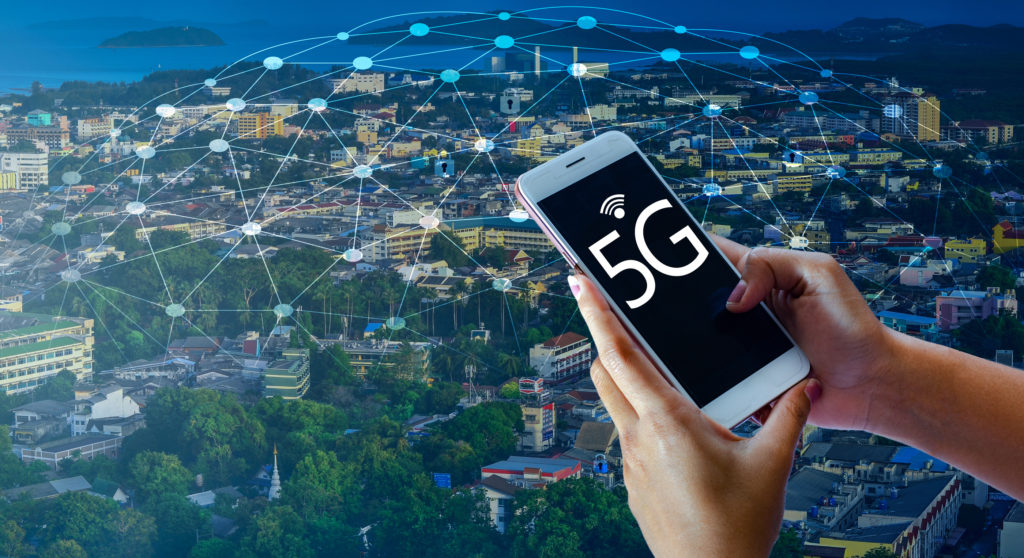
5G networks are expected to be available in the next few months. This once-in a decade upgrade to our wireless systems promises mobile speeds that will enable an entire movie download in a matter of seconds.
To get the full benefits of 5G networks, users will have to buy new 5G-enabled phones and carriers will need to install new transmission equipment to offer faster service.
How fast 5G works for you will depend on where you live, which wireless services you use, and when you take the 5G plunge. According to wireless chip maker Qualcomm, 5G download speeds are roughly 20 times faster than the current 4G experience. Downloading a typical movie would take 17 seconds with 5G, compared with six minutes for 4G.
Improved Latency
Smartphone response to voice commands aren’t exactly instant right now. A lag of 50+ milliseconds is common. 5G, using newer networking technology, was designed to reduce latency down to just a few milliseconds. It was also designed to deliver signals more reliably than earlier cellular networks.
It even makes a difference in the size of virtual reality headsets. Now bulky and wired, VR headsets would be wireless, freeing users to move around, and smaller, the size of eyeglasses.
The impact of 5G extends to medicine and other fields that rely more and more on high speed connections. “If you talk about remote surgery or connected cars, you don’t want latency times to be too long,” said Fredrik Jejdling, and executive vice president at Ericsson, a cellular equipment company.
Timing
Smart phones aren’t ready yet for a direct connection to 5G networks. But AT&T, Verizon and Sprint are all expected to start providing 5G services for smart phones in the second quarter of 2019.
However, the full benefits of 5G aren’t expected until American carriers upgrade key central switching equipment, which may not happen until late 2019 or sometime in 2020. While Verizon and AT&T plan to later add 5G services based on lower frequencies that offer wider coverage but may result in slower initial speeds, the first 5G handsets may not work with those portions of their networks, so the reach of 5G signals for those phones may remain limited.
Michael Thelander, president of wireless consultancy Signals Research, says, “I wouldn’t buy a 5G phone until it supports 5G in one of the lower-frequency bands. For all operators but Sprint, this means at least late 2019, and more likely 2020.”
According to a timetable compiled by Qualcomm, Britain, Germany, Switzerland, China, South Korea, and Australia are expected to follow the United States with 2019 rollouts of 5G.
Will Your Industry Be Affected?
Smart Phones aren’t the only devices that will be affected by 5G. Devices like industrial robots, security cameras, drones, and cars that will send traffic data to one another will also see big changes, as will video games, sports, and shopping. Faster networks could help spread the use of artificial intelligence and other cutting edge technologies.
How will 5G affect your industry? Don’t wait to find out! The IEEE 5G training program is coming soon to the IEEE eLearning Library. Subscribe to the eLearning Library today to be among the first to have access.
Resources
Clark, Don. (31 Dec 2018). 5G Is Coming This Year. Here’s What You Need to Know. The New York Times.


[…] integration of edge computing and 5G networks hasn’t made a major impact in the manufacturing marketplace just yet, but it […]
[…] Huawei launched the MH5000 module, which will contribute to the company’s plans to commercialize a 5G network for the automotive sector as early as the second half of this year. […]
[…] 5G communication is projected to perform upwards of 1,000 times faster than 4G, making devices respond in a matter of milliseconds. OpenSignal reports that, after comparing user-initiated speed tests from more than 1 million devices, AT&T’s 5GE phones get average speeds of 28.8Mbps, falling right between T-Mobile’s 29.4Mbps and Verizon’s 29.9 Mbps, and Sprint’s 20.4Mbps. The AT&T average of 18.2Mbps on non-advanced LTE was also slightly behind T-Mobile and Verizon but ahead of Sprint. So AT&T’s 5GE speeds are typical LTE-Advanced speeds. […]